How to Avoid Getting Scammed or Robbed in Europe
Don’t let yourself be a victim. These nifty tips and tricks will allow you to outsmart any thief in Europe.
Sandra L. Oct 5th, 2016
To many of us, Europe is a dream come true, and the last thing you want to worry about while strolling down the romantic streets of Paris is getting robbed. Yes, maybe you’ve heard horror stories from your friends who have travelled to Europe. The beautiful hotspots are also the perfect grounds for thieves and scammers to earn a few bucks – or more. Some are so good at their “job” that they earn a thousand a week and drive luxury cars, so you should definitely take precaution! Getting robbed is not inevitable.

Local Europeans know all the tricks in the book and how to avoid them. Even though being a tourist makes you more of a target, you still can enjoy Europe without fear. Read on for the ultimate guide on how NOT to get scammed, robbed, or pickpocketed in Europe.
Prep for your travels
Store valuables in a money belt
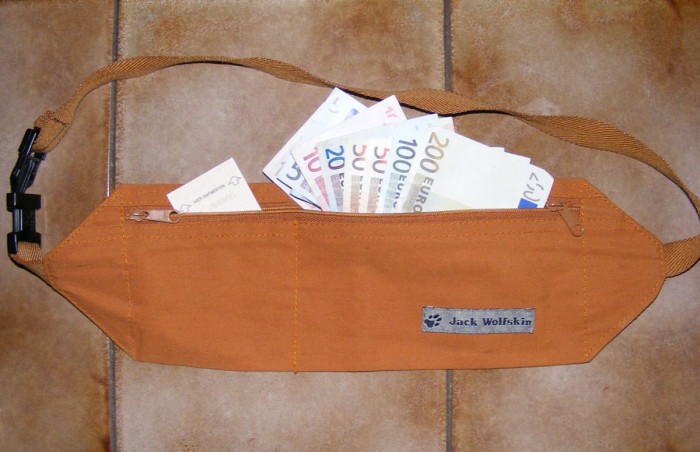
Image credit: User:Mattes
You should get a money belt, which is a little pouch for storing money, credit cards and even your passport. It is thin, discreet and can be strapped around your waist and tucked underneath your pants.
Duplicate important documents and backup your phone
Make copies of your important travel documents such as your passport or rental vouchers. You can snap quick photos of them or print photocopies. You never know if you may lose something important so this will get you out of tight spots.
Also, arrange backup for your photos, perhaps through cloud storage, so you cannot be robbed of your precious shots even if you lose your phone or camera. Same goes for your chat logs and contacts.
Purchase insurance
Not all insurances are created equal! Make sure your insurance plan comes with theft insurance and check how much is claimable. Keep receipts and photographs of expensive items such as electronics so that you can provide proof that you did indeed own them. Also, if a theft occurs, make sure you file a police report within 24 hours.
Pack sensible clothing

Image credit: Hernán Piñera
Tourists easily stick out like a sore thumb because of the way they look, dress or behave. If you’re an Asian tourist in Europe, don’t stick out even more by wearing bright colours or loud clothes – it is like holding a sign saying “I am a vulnerable tourist!” Also, leave your luxury luggage and expensive jewellery at home.
Buy locks for your bag
If you are staying in hostels and feel paranoid that someone will sift through your luggage while you are out, go get locks for your bags. Then you can lock your zippers together and — even better — lock your bag to its bag strap if possible. If your suitcase has a luggage lock fixed to the side, use that!
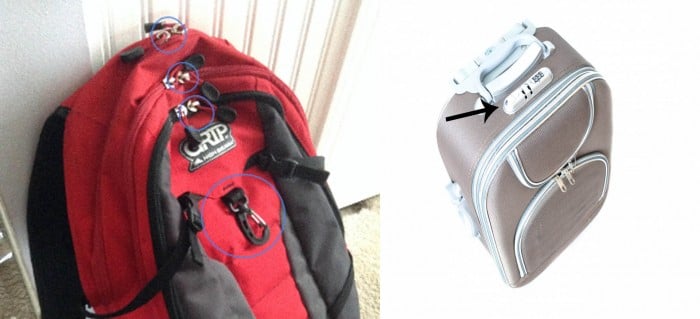
Image credit: George Hodan and Gamingforfun365
For the bag in the photo, you can lock all six zippers together and connect them to the harness in the middle
This is because thieves can actually open your bag even if your zippers are locked, by pulling your zippers all the way to the edge and using a pen to poke through the zipper and open it up. What is this sorcery? I learnt this the hard way when my money was stolen from my luggage while I was on a bus. I did not realise until much later because they can then re-zip the whole bag so you can’t tell it has been opened. So, secure your zips tightly so they can’t be pulled to one side.
While exploring Europe
Don’t carry valuables with you

Leave your laptop and valuables in your hotel or hostel room while you’re out exploring. Theft is much more likely to occur when you are out and about. So, use the hotel’s provided safe or keep your items in a bag so they aren’t just lying around in plain sight.
Secure your things
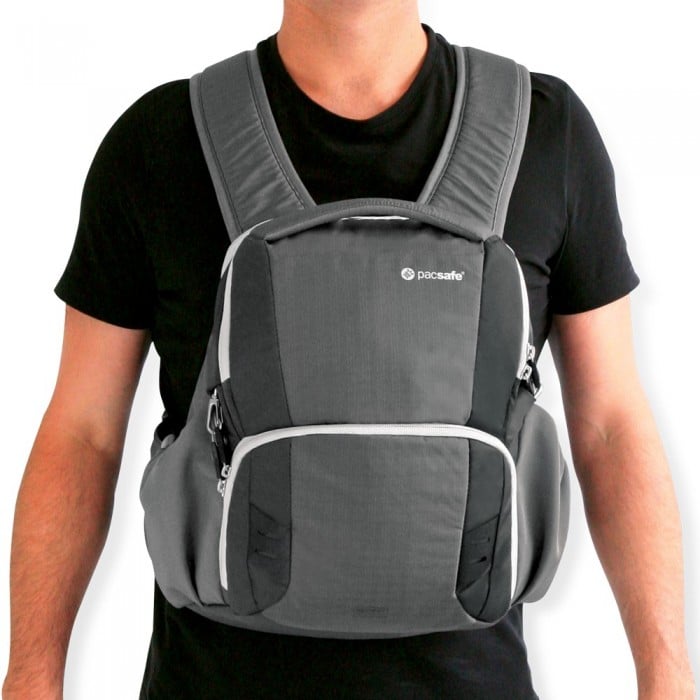
Image credit: pacsafe
Make it as inconvenient as possible for thieves to access your things. When you are walking through a crowd, carry your backpack in front of you . You might feel silly, but it prevents thieves from sneaking up behind you and slashing your bag open. My friend once caught a pickpocket opening her bag, but you may not be so lucky (or alert).
When you are seated, loop your bag strap around your arm or a chair leg . You can bring clips to secure your bags to luggage racks or seats when taking a bus or train. Keep your zippers closed with a twist tie or lock as well.
Also, don’t leave your wallet or phone on the bathroom sink or even the restaurant table. Make sure it’s always on you and don’t let it out of sight. Someone might be waiting for the opportunity to grab it and run!
Be aware of your surroundings
The hustle and bustle of vibrant Europe can be a lot to take in. That is when thieves take advantage of vulnerable tourists. So you should be alert in crowded and popular areas. Thieves also deliberately stage commotions like starting a fight, quarrel, or bumping into you to distract you. While you are busy dealing with the situation, they will pick your pockets. Hold onto your things and avoid commotions . Public transport is especially dangerous because pickpockets can grab things and run out at the next stop.
Exchange currency at registered places
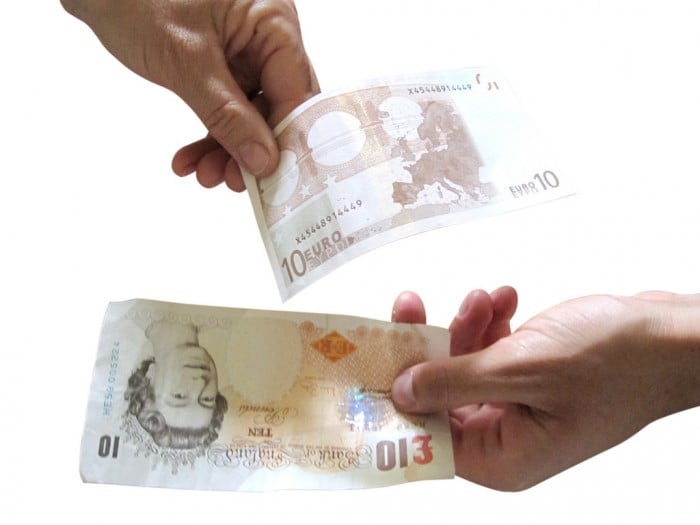
Image credit: Images Money
When you travel in eastern Europe, you will find many people at railway stations giving you great exchange rates. It will seem tempting, but do not exchange money with them as they may give you fake notes or the completely wrong currency. Stick to registered money changers .
Avoid gypsy thieves
Gypsies are notorious for theft in Europe. They are Romani people, but commonly called gypsies. Some have integrated into society, but many turn to thievery for a living. Avoid gypsy children as they have been known to steal skilfully. If someone approaches you and speaks in English, you should reply in the local language (For example “Pardon, Francais?”). That will make them think you are local and they will walk away.
Scams to avoid like a plague
There are so many scams in Europe. However, if you’re a smart tourist, you can spot the obvious ones. We are going to cover a few popular scams so you have an idea of what a typical European scam looks like.
The petition scam
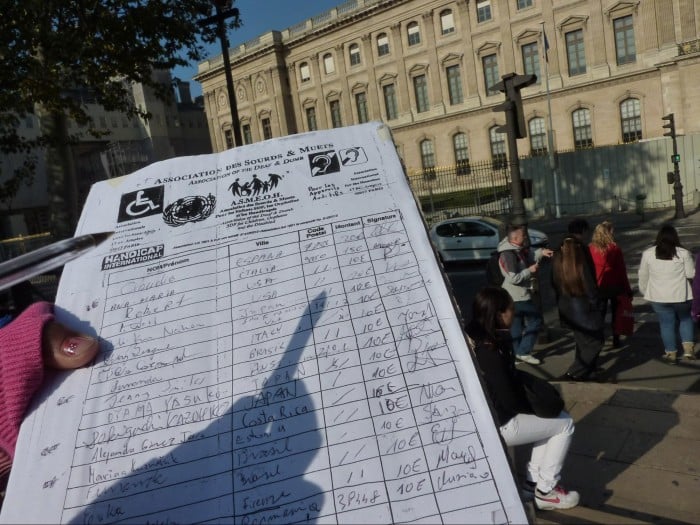
Image credit: Paris Insights
Young women will approach you and ask you to sign a petition. You sign it out of goodwill. Then, bam! She’s suddenly saying you agreed to donate $20 by signing the petition. Avoid petitioners. You will feel rude, but it’s not worth the trouble.
The ring scam
You spot a shining thing on the floor. It’s a golden ring! You pick it up, and suddenly a person runs up to you. She says she lost the ring and asks you to pay for it, or she pretends she was going to pick the ring up too but is willing to let you keep it for a small fee. Just don’t pick the ring up. The whole thing is set-up and you are the prey.
The bracelet scam
People will try to sell you friendship bracelets. They might forcefully tie it on your arm and demand payment. Often, while you are trying to get rid of them, your wallet or watch may disappear too. Be firm and escape before they tie the bracelet on you.
People who help you buy metro tickets

Image credit: Tiia Monto
Some scammers wear the “official” uniform of the metro or act as polite, helpful citizens. They help you make sense of the tickets and purchase them for you. Then, as you try to board, you realise they are students’ tickets and you can’t use them. Wise up, check the routes before travelling and buy them yourself or visit the official ticketing kiosk and ask for help.
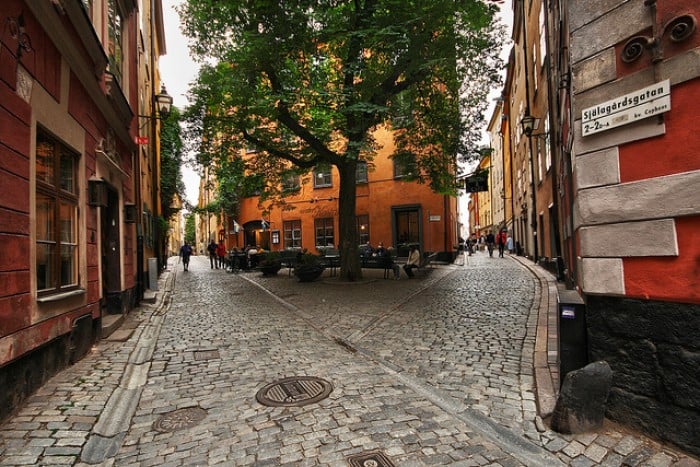
Image credit: Miguel Virkkunen Carvalho
Basically, if anyone tries to sell you things you don’t want or asks for money, donations or signatures…ignore them! Watch the locals and see who they avoid. Once you know the signs, they are easy to spot.
Stay safe and let your dream trip to Europe be full of fun and exciting memories. Eat sausages at Berlin and marvel at Prague. Don’t let these party poopers spoil your holiday! Follow this guide to avoid getting robbed, scammed, or pickpocketed by opportunists in Europe.
5 Scams To Avoid When Traveling In Europe

Europe is a beautiful country to visit. The problem with traveling to a foreign country is that there are many scams to avoid, this holds true to Europe as well. While you’re out there wandering around Europe you might find that you encounter some common traveler scams in Europe. These popular travel scams happen to the best of us and that’s why I wanted to feature our list of the top 5 scams to avoid in Europe.
5 Scams To Avoid In Europe
Not Free Flowers
This scam is one of the more popular scams you’ll see around Venice and Rome. You’ll find that a man walks up to you with a bouquet. He’ll insist that the flowers free, and more than likely force them into your hands.
He’ll be very insistent that you take these free flowers, however, once you lay your hands around these flowers he’ll be adamant that you must pay him a tip. Our advice to you is to remember that nothing in this world is ever really free.
Pros and Cons Staying On or Off-Site at Disney
People Dressed in Costumes
While in Rome you may find gladiators dressed up asking to take a photo with you, and in other areas of Europe you’ll find other people in costumes that insist on taking a photo with you. You being the avid traveler that you are, will love the opportunity to capture a photo with these people.
The problem with this scam in Europe is that most of the people dressed in costume will insist on a fee after you’ve already taken the photo. Our advice is to never take a photo with anyone dressed in costume while you’re in Europe.
Taxi Driver Scam
Hopefully, you’ll never have to experience this popular scam in Europe where taxi drivers will turn off their meter to get you to pay a high price for that little drive. Some taxi drivers have been known to take advantage of foreigners visiting Europe by offering a ride, but then turning off their meter and insisting on a high price tag for giving you this ride.
If you’re already in the tax, then you probably won’t be able to avoid this scam. Try to walk if you can and rent a car or something like that so that you won’t fall victim to this taxi driver scam in Europe.
Friendship Bracelets
Yes, there’s a friendship bracelet scam. Much like the flowers scam in Europe we shared above, this friendship bracelet scam happens so fast you won’t even know what hit you. People walk around the streets and come up to you to place a friendship bracelet on your wrist in record time.
These people will then demand a fee for their friendship bracelet, even though you never asked for one. Keep your eyes peeled and wrists covered so that you don’t fall victim to this silly scam in Europe.
Take Your Time
Lastly, we all know how fast-paced our world is. We run around and live a busy lifestyle, but over in Europe, they run a little slower. Merchants there have figured out how fast-paced Americans are and will often take advantage of your impatient nature with this scam in Europe. You’ll pay for something at a vendor with a larger bill, and they’ll take their sweet time counting back the change, sometimes citing that they don’t have the correct change to give you anyway.
This usually ends up with them making out with extra money for something because you’re in such a hurry that you won’t wait to figure out something different. Our advice to you is to remember that this is a scam that happens often in Europe and you should be more relaxed and at a slower pace during your time in Europe to avoid such scams.
Sadly there are a lot of tourist scams in Europe. It seems while you’re out there on a mission to enjoy a fabulous vacation, others are looking to get a quick dollar or take advantage of unknowing tourists. That’s why we just had to share these top 5 scams to avoid in Europe, we’d like you to enjoy your vacation without having to fall prey to those ready to pounce tourists for their money.
Common Scams to Avoid While Traveling

Getting scammed can happen to the best of us. Learn what to watch for to avoid being a target.
3 Common Scams to Recognize Abroad
At some point during your travels—if it hasn’t happened already—you may be scammed. It happens to the best of us. There are tons of scams to be wary of, but watch out for the following three in particular.
Request from a Kind Stranger
Never, it bears repeating, NEVER agree to transport packages, envelopes, suitcases, or anything not belonging to you, for a stranger—no matter how desperate or heartbreaking their story may seem. You could become an unsuspecting smuggler or mule. If you have two hours to spare, watch the movie Brokedown Palace to see what happens to Claire Danes’ and Kate Beckinsale’s characters after falling for an attractive drug smuggler in Thailand. If you’re caught smuggling anything illegal, local officials won’t care that you were scammed into the situation. If you’re ever asked to transport anything for a stranger, say no and walk away.
This Round Is on Me
You’re overseas and meet a gorgeous local at a bar, or you end up at a bar of his or her choosing. Next thing you know, your new friend is gone, and you owe the bar an exorbitant bill. Don’t have a credit card? Don’t worry, the scammers may even take you to an ATM to get the money you owe.
Men tend to be the most common target for this scam. There have been times when the victims pay the bills, sometimes in the thousands, just to remove themselves from the situation. If you’re at a bar, ask for the cost of a drink before ordering, each time. Or pay for each round individually. This may seem paranoid, but you’re better off safe than sorry—and with your savings intact.
Insta-Scammed
Keep in mind that your travel could make your family back home susceptible to a scam. In what is commonly referred to as the grandparents scam, a con artist calls your family pretending to be you and asks for money. They make your family believe it’s an emergency and ask for the money to be sent through Western Union. Usually, the level of information that can make this type of scam possible is readily available online.
So, what can you do to try to protect yourself from this type of scam?
- Limit the amount of information you put on social media.
- Don’t post in real time and tag your location (i.e. #latergram should be your rule of thumb when posting photos).
- Use strict privacy settings on social media.
- Keep in touch with your family.
Resources
If you’ve been scammed while on a Harvard-related trip abroad, let us know so we can provide you with the proper support. While abroad, contact International SOS, our 24/7 global emergency response program, at +1-617-998-0000 or through the Assistance App. You can also contact International SOS after the fact. Learning about your experiences helps us educate future travelers.
Before you travel, research your destination thoroughly. The following resources can help:
Source https://www.tripzilla.com/avoid-getting-scammed-robbed-europe/45802
Source https://touristmeetstraveler.com/2020/5-scams-to-avoid-when-traveling-in-europe/
Source https://www.globalsupport.harvard.edu/travel/advice/common-scams-to-avoid-while-traveling